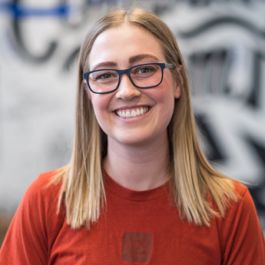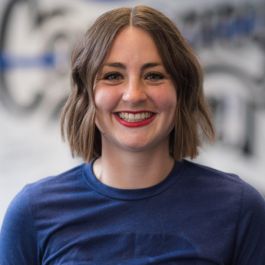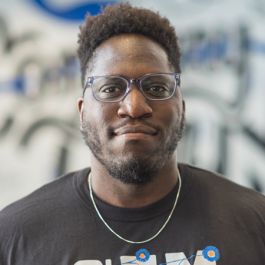An ultra marathon runner.
A home improvement DIYer.
A present father.
At a glance, these backgrounds might not seem to overlap, but they meld together at CompanyCam, where individuals with varied interests and backgrounds work as a team to support a visual-first job site communication app.
In addition to the many professional talents on the company’s team, some of the most impressive and meaningful passions CompanyCam employees pursue happen outside of work. That is thanks in part to the company’s leaders seeing value in not only supporting their work-life balance by operating as a hybrid organization, but also in acknowledging who they are outside of their roles.
“I don’t feel like CompanyCam treats me like an employee — they treat me like a person,” said Recruiter Shelby Clauson. “They put me first and care about my well-being so I can be the best person, both in and outside of my job.”
Prior to joining the team, Clauson’s own candidate experience convinced her she had found the right fit. “I had an interview with VP of People Lauren Conger, and she didn’t ask the standard ‘tell me about yourself’ interview questions,” Clauson explained. “I knew she wanted to get to know me as a person, not just as a candidate.” If her interviews were anything to go by, she felt confident that she’d be able to put the same thought and care into her role as a recruiter.
While many CompanyCam colleagues are based in and around the Lincoln, Nebraska, headquarters, they’re not limited to working exclusively in the office. On the more in-person end of the hybrid-workplace spectrum, Director of Marketing Management Hannah Bauer averages a 50-50 balance between the office and home, allowing her to prioritize her passion for both organic team interactions and long distance running. As for Clauson, working remotely most days grants her the flexibility to be home with her “pandemic pup,” in addition to flourishing as a new homeowner-turned-DIY-enthusiast.
On the fully remote side of the workplace spectrum is QA Automation Engineer III Fola Orokunle. A Midwest-based engineer by day, Orokunle is a father to a curious 4-year-old who doesn’t shy away from making an appearance at his meetings. He recalled that, during his search for a new role, an adaptable schedule was top of mind, and CompanyCam fit the bill perfectly. “There is a level of flexibility, openness and trust that I’m still getting work done, even if it’s kind of at odd hours,” he said.
Before the end of the day, Orokunle will sign off from work and cook dinner for his daughter. Though he hopes to further his culinary skills and eventually expand the boundaries of what she’ll eat, there are certain special requests he can’t pass up. “Today’s her first day of school, and she asked for butter chicken, so that’s what we’ll be doing.”
Whether there’s another marathon on the horizon for Bauer, a new home improvement challenge for Clauson or a new meal to experiment with in the kitchen for Orokunle, they have time and leadership on their side — supporting them to be who they are, where they want to be and with the people they want to be around.
How do you keep your work and life balanced as …
- A remote employee: “By being honest with myself and knowing when I need to take a break. Honestly, that’s the hardest part. I am in front of the computer for 12 hours a day sometimes, so I’m conscious of what I’m feeling and what kind of work I need to do.” — Fola Orokunle
- A more at-home hybrid employee: “I turn off Slack and shut my computer when my day is done or I’ve accomplished a good amount of work. As I’ve been remote for 3 years now, I’ve been able to draw lines between work and home and create better balance.” — Shelby Clauson
- A more in-person hybrid employee: “A lot of it is making sure that I am doing the things that maintain my stasis as a human. I get up early, and I run three days during the work week. I also want to take my time after. The hybrid schedule really supports that.” — Hannah Bauer
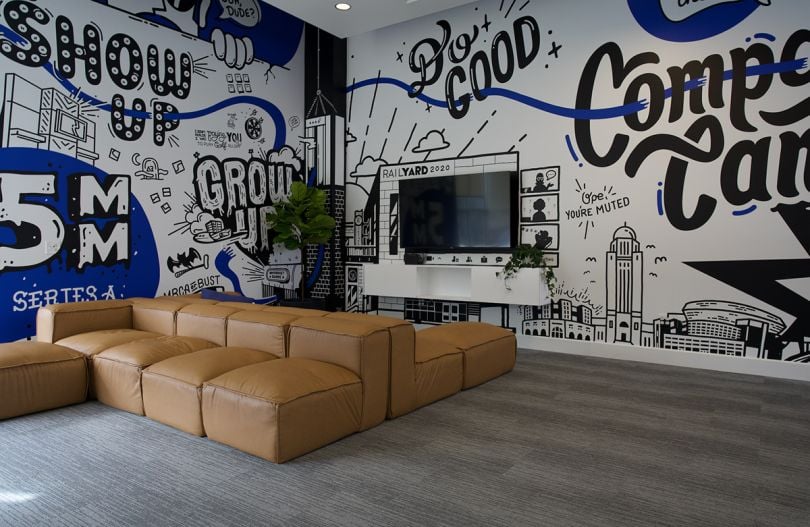
What does CompanyCam’s hybrid work model look like?
Recruiter Shelby Clauson: Our employees have the option to work in the office if they live in or around Lincoln, Nebraska, or from home. We get to decide what’s best for ourselves on any given day. We all work across multiple time zones — from the East Coast to our team member in Hawaii — but we still find ways to be effective as a dispersed team. We also don’t regulate the hours that our employees work; we trust everybody to get their work done in whatever time frame works best for them. One thing I’ve noticed — I schedule a lot of interviews, so I see many people’s calendars — is that even the busiest people take time every day to go pick up their kids or do drop-off. Allowing that flexibility is awesome for every level of employee.
Why is it important for a company to put its people first, particularly in a hybrid workplace?
Director of Marketing Management Hannah Bauer: It’s table stakes for finding and retaining talent. Part of CompanyCam’s flexibility is the progression of where we are in time, and some of this also comes from our founder, Luke Hansen. He prefers being in the office and loves getting face time with people, but he has no interest in dictating when or how people work, which is traditionally what a lot of old-school employers do. The expectation to be somewhere — even online during a set window of time — is an out-of-date practice. We’re working for money, and there’s no reason why, if we’re doing the things we need to be doing to get the job done, an employer should be able to exercise that level of control over our day to day.
What people-first benefits or resources does CompanyCam offer?
Clauson: We’ve changed our verbiage around unlimited time off to minimum time off, because once presented with that, most people take off less than they would with accrued time. What minimum time off means is every employee is required to take off a minimum of three weeks per year. We run a report toward the beginning of Q4, and if you haven’t met that, our VP of people will message you. This allows employees to step away and unwind for whatever reason they need to — whether to go on vacation, take the next couple of Fridays off or take a day to run the errands you can’t accomplish during the week.
QA Automation Engineer III Fola Orokunle: The biggest thing for me is having leadership, direct and indirect, that walks the walk. I am on multiple teams here at CompanyCam, and I have a manager who checks in on how I’m feeling, whether my work level is adequate or if I feel overworked — without me bringing it up. That kind of stuff drives home the point that the bullet points of our benefits are cool, but if they’re not followed with people actually taking action, it doesn’t mean much. Thankfully, it means a lot here.
Putting People First
Fola, what is your day like as a remote engineer?
Orokunle: I work across three different teams. Generally, I try to block off early mornings for meetings, and I have focus time in the middle of the day where I’m either writing code or training somebody. I have the space to say, “Hey, this is what my schedule looks like,” and people respect that. Our engineering department by and large is egoless and focused on building something special. If you’re looking to learn and you’re willing to humble yourself, this is a great environment for you.
Shelby, how does hybrid work allow you to find success in your role?
Clauson: I am a very social being. When I am able to socialize, I can sit and talk to people for hours. But in my role, there’s a lot of detail orientation with scheduling and making sure my candidates are taken care of. When I work from home, I put myself in a box — my office — where I’m able to go heads down and focus. I know where my weaknesses are; I will be too social. If I was in the office, I would be looking at and talking to people. That’s why I like to be at home, and that’s how I find success.
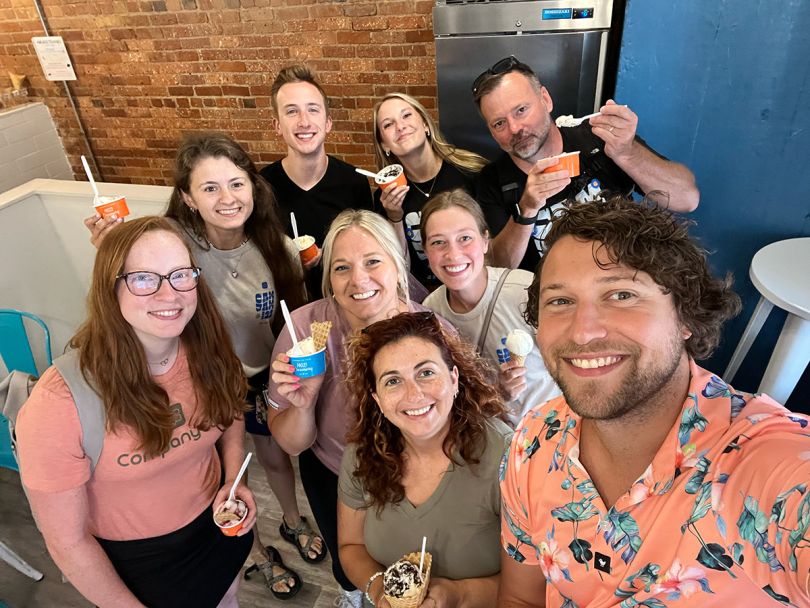
Hannah, what do you find most beneficial about going into the office?
Bauer: The organic conversations you can have. The work that my team and I are doing in marketing is highly relational, and when I’m hiring, one of the things I look for is not necessarily the most outgoing, friendly “people” person, but someone who will be able to get others to work with them and build those relationships. The work itself is so subjective. With programming or QAing, either it’s good and it works or it doesn’t. Marketing work is not really like that; it is a lot of, “We could do this, or we could do that,” and we won’t know what works until we do it. You need to have a high level of trust and collaboration with people to go about that well, and I find that I can facilitate that if I am going in and having face time with people.
What is a meaningful personal achievement you’ve accomplished by having work-life balance?
Orokunle: It really comes down to being a present father: There are very few things that I’m good at, but I like to think I’m pretty good at that. Working at CompanyCam has helped me shape my life in a way where my daughter can still be the center of everything I do — even when I still have to pay the bills.
“Working at CompanyCam has helped me shape my life in a way where my daughter can still be the center of everything I do.”
Clauson: Working and living in the same space, it’s hard to draw those lines. A big personal achievement for me has been my ability to turn things off and be fully present with the people I care about and want to surround myself with. That wasn’t always the case before, and that’s something I’m really proud of. It takes a lot of willpower not to work late or check Slack before bed, especially in the tech industry and the day and age where everybody’s phones are so accessible. It’s been a good challenge for me.
Bauer: About a year ago, I spoke at a local event that was kind of like a TED Talk, but less serious. I was able to do a lot of the prep for the talk — practicing, putting slides together — during the day. But also, about 10 people from CompanyCam came and watched, and that was really cool. Beyond me, we have a lot of people who are in bands — so many so, that for our all-company event a couple of weeks ago, three different bands made up of all employees formed just to play at the event. People come out to support our coworkers — we not only allow for that, but we actively encourage it.



